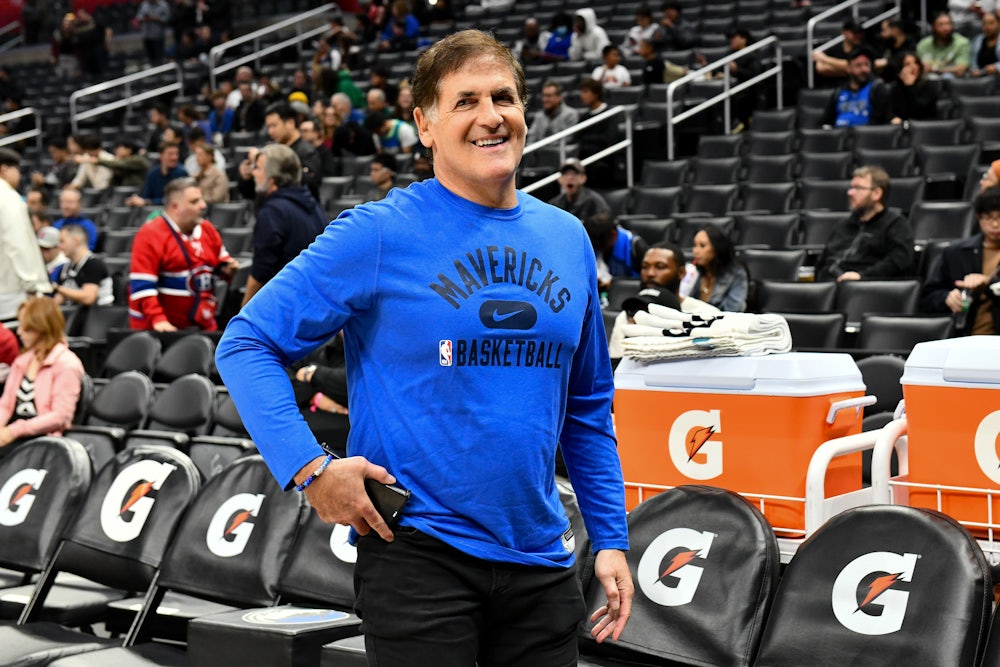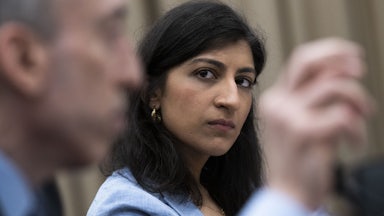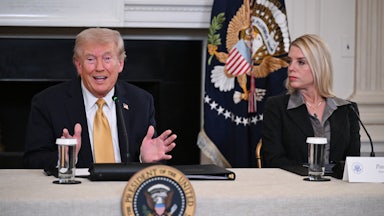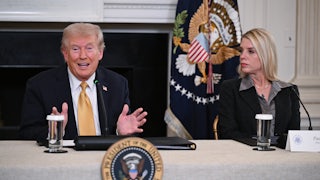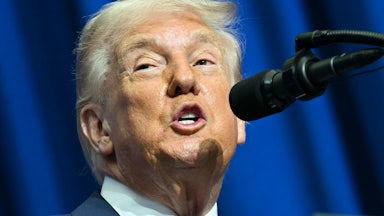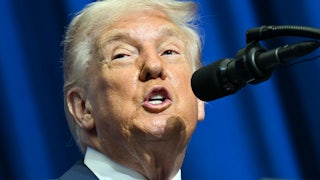To whatever extent the 2024 election was a contest over who could raise the most money, it’s over. Kamala Harris won.
Through August, the Democratic presidential ticket raised $678 million and the Republican ticket raised $309 million, according to the most recent reports from the Federal Election Commission. Harris herself raised more money after she entered the race this past July than Donald Trump raised going all the way back to 2023. Throw in funds raised for Harris’s campaign by affiliated party committees, and Harris raised a reported $1 billion in just three months, which is more than Trump and his affiliated party committees raised all year. Trump still has a fundraising edge with billionaire-funded Super PACs, but even that may not last. No political candidate in America—possibly no political candidate anywhere—ever raised so much cash so quickly as Harris. Trump is visibly panicking about this (though not enough to dig into his own pocket, something the billionaire candidate hasn’t done since 2016).
Granted, winning the money race will get you only so far. Hillary Clinton, the Democratic Party, and various Super PACs raised twice as much as Trump in 2016, yet Trump won. Still, out-raising your opponent does confer one undeniable benefit. It frees you from having to worry what rich donors will think as you hone your campaign message during the home stretch.
Which brings us to the billionaire investor and Shark Tank cast member Mark Cuban. Cuban, according to Forbes, is worth $5.7 billion. He holds no formal position in Harris’s campaign, but he’s become Harris’s go-to surrogate on economic issues. In that capacity, Cuban tries to reassure his fellow plutocrats that Harris isn’t serious about addressing economic inequality. He is performing that service altogether too well.
“The feedback I’m getting,” Cuban told Politico even before Harris formally became a presidential candidate, “but certainly not confirmed by the VP, is she will be far more open to business, [artificial intelligence], crypto and government as a service. Changing the policies changes the message and lets everyone know she is in charge and open, literally, for business.”
This raises the question, “Far more than whom?” Than President Joe Biden, of course, whose economic policies represent a significant shift leftward from previous Democratic administrations. Cuban voted for Nikki Haley in the Texas Republican primary, but he threw his support to Biden after Haley lost to Trump. Since Harris entered the race, Cuban has repeatedly sought to steer Harris away from Biden’s policies and away from the Biden political appointees who have implemented those policies. This is not helpful.
Biden proposed increasing the capital gains tax from 20 percent to 39.6 percent for households that earn more than $1 million. Harris said last month that she would scale that increase back to 28 percent. Afterward, Cuban told a CNBC audience, “Kamala Harris is pro-business. This is Kamala Harris’s campaign. It’s not Joe Biden’s campaign.” Cuban suggested the modification was his idea. “She listens, right?” Cuban said.
This is not something where it’s just her policy piece comes out and says Mark, you know, or whoever, let’s hope this works. No, she’s like, “List me things you think we should be talking about. You’re the entrepreneur, you invest in more startups than anybody I know, what do you think we should be doing?”
Biden proposed, for taxpayers whose wealth exceeds $100 million, a 25 percent tax on unrealized capital gains. Cuban assured that same CNBC interviewer that he talks to Harris aides “three, four times a week” and that “every conversation I’ve had is that it’s not going to happen.” It seems pretty clear that Cuban doesn’t want it to happen.
Biden appointed Lina Khan chair of the Federal Trade Commission. Along with Jonathan Kanter, who runs the Justice Department’s antitrust division, Khan is working to revive government challenges to corporate monopolism. Cuban told Semafor last week that “if it were me, I wouldn’t” reappoint Khan, echoing similar calls from billionaires Reid Hoffman and Barry Diller. Cuban’s comment prompted sharp retorts from Senator Bernie Sanders and Representative Alexandria Ocasio-Cortez, but Harris offered no word of support for Khan.
Harris remained similarly silent after Cuban laid into Gary Gensler, chairman of the Securities and Exchange Commission (and, like Khan, an admirably tough regulator). Cuban told Yahoo! Finance that he confronted Gentler in a CNBC greenroom.
“I told him this,” Cuban said. “You’re screwing the whole thing up, you’re pushing industries overseas.” Did I mention that the SEC prosecuted Cuban unsuccessfully some years ago for insider trading? In September, Cuban told CNBC, “Put my name in for the SEC, it needs to change.” More recently, Cuban told Politico’s Declan Harty, “It’s not a job I will chase, but if asked, I would want to be interviewed.”
In an interview with Cuban last week, Astead Herndon, host of the New York Times podcast The Run-Up, asked whether Harris was tacking toward Cuban’s positions on the economy and away from those of Senator Bernie Sanders. “Right,” Cuban said:
If the number one issue is economy and the way to solve people and make people feel good about what she’s doing is to talk business and talk economy and talk opportunity, and that’s what she’s talked about. And I think you have to be in the middle to do that.
These words may soothe corporate donors (Cuban helped found a group called VCs for Kamala, which now has 866 signatories, as well as another group called Business Leaders for Harris). But they won’t win Harris new voters. The electorate wants higher taxes on the wealthy (79 percent favor tax hikes for the rich, including 63 percent of Republicans, according to a February poll by Navigator Research) and stricter regulation of industry (clear majorities nationwide favor stepped-up regulation of artificial intelligence, firearms, pharmaceuticals, and nine other industry sectors, according to a September YouGov poll).
You may have heard me say once or twice before that to win this election Harris needs to win the working class—or at least not lose it by very much. To win over these voters, Harris can’t hug the center on economic issues, because the center isn’t where the working class resides. On economic matters, the working class is situated well to the left of what most Democrats (though not Biden) still regard as the political middle.
If Harris really is tacking toward Cuban’s economic positions and away from Sanders’s, then she needs to come about, because it’s Sanders’s economic policies that align most closely these days with working-class voters. Polling further suggests that you don’t run much risk of losing more affluent voters by saying what Sanders says about the economy. The only people you risk offending are billionaires like, well, Mark Cuban. And now that Harris has well over $1 billion of her own in the bank, she can leave that worry behind.
